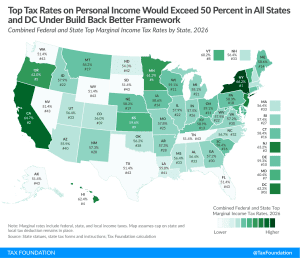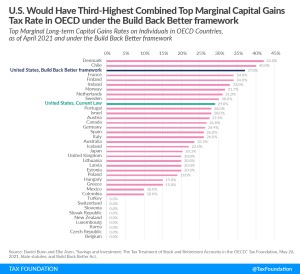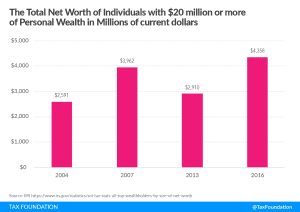The economic crisis caused by the coronavirus pandemic poses a triple challenge for tax policy in the United States. Lawmakers are tasked with crafting a policy response that will accelerate the economic recovery, reduce the mounting deficit, and protect the most vulnerable.
To assist lawmakers in navigating the challenge, and to help the American public understand the tax changes being proposed, the Tax Foundation’s Center for Federal Tax Policy modeled how 70 potential changes to the tax code would affect the U.S. economy, distribution of the tax burden, and federal revenue.
In tax policy there is an ever-present trade-off among how much revenue a tax will raise, who bears the burden of a tax, and what impact a tax will have on economic growth. Armed with the information in our new book, Options for Reforming America’s Tax Code 2.0, policymakers can debate the relative merits and trade-offs of each option to improve the tax code in a post-pandemic world.

Tracking 2021 Election Results: State Tax Ballot Measures
Through 10 ballot measures across four states—Colorado, Louisiana, Texas, and Washington—voters will decide significant questions of state tax policy.
7 min read
Austria’s Budget Comes with Tax Cuts and Carbon Levies
Austria should not shy from lowering the corporate income tax rate sooner or even implementing a more ambitious tax reform to improve its tax competitiveness and contribute to greater economic growth.
3 min read
Top Tax Rate on Personal Income Would Be Highest in OECD under New Build Back Better Framework
Under the latest iteration of the House Build Back Better Act (BBBA), the average top tax rate on personal income would reach 57.4 percent, giving the U.S. the highest rate in the Organisation for Economic Co-operation and Development (OECD).
2 min read
Federal Deductibility Is Distorting Tax Liability in Six States
The intentions behind federal deductibility are undoubtedly pro-taxpayer. Unfortunately, that is not what happens in practice. Tax liability is not reduced. It is distorted.
7 min read
Proposed Top Combined Marginal Capital Gains Tax Rate Would Be Third-Highest in OECD
Under the new Build Back Better framework, the United States would tax capital gains at the third-highest top marginal rate among rich nations, averaging nearly 37 percent.
1 min read
Lawmakers Consider Untested and Complex Policies to Fund Reconciliation Bill
Congress is debating new ways to raise revenue that would make the tax code more complex and more difficult to administer. The new proposals—imposing an alternative minimum tax on corporate book income, applying an excise tax on stock buybacks, and, at one point this week, a tax on unrealized capital gains for billionaires—are unreliable and highly complex ways to raise revenue.
10 min read
Fixing Tax Treatment of Capital Investments Could Improve Supply Chain Resiliency
While taxes are not at the root of supply chain disruptions, improvements to the tax code could make supply chains more resilient in the future.
3 min read
New Study Shows Tax Policy Has Strong Effects on Innovation
When examining how tax policy impacts the economy, researchers typically look at labor supply and investment responses. One other channel through which taxes impact the economy has been less studied: innovation.
3 min read
The Rich Are Not Monolithic and Taxing Their Wealth Invites Tax Collection Volatility
Congressional Democrats are reported to be weighing a special tax on the assets of billionaires to raise revenues to pay for their Build Back Better spending plan. There are two fundamental challenges to such a plan.
8 min read
How Would House Dems’ Tax Plan Change Competitiveness of U.S. Tax Code?
The legislation put forward by Democratic members of the House of Representatives would reverse many of the 2017 reforms while increasing burdens on businesses and workers.
2 min read